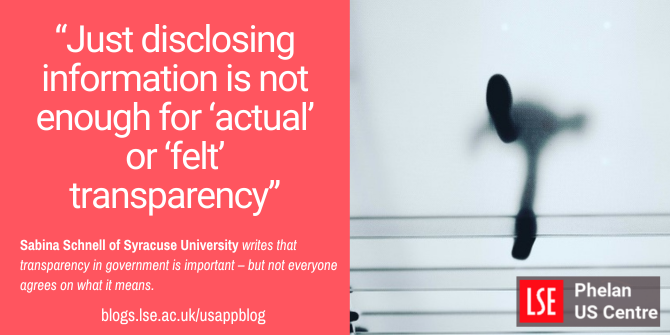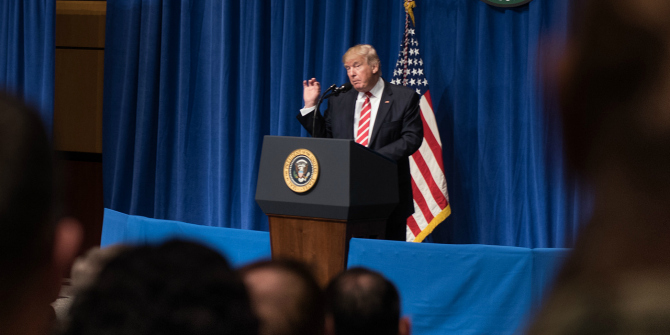 Transparency can help citizens to determine if and how their government is working in their interests. But citizens have different understandings of transparency and how it can and should operate. In new survey research, Sabina Schnell, and co-authors, identify four different philosophies of government and associated views of transparency: Regime Guardians consider transparency important as a constraint on government. Virtue Professionals see it as related to ethical behavior. Democratic Humanists and Civic Scientists view it as important to ensure governments serve the people and make decisions based on scientific evidence. While transparency can build trust in government, public agencies need to keep in mind that diverse audiences need to both see and understand what government is doing and why.
Transparency can help citizens to determine if and how their government is working in their interests. But citizens have different understandings of transparency and how it can and should operate. In new survey research, Sabina Schnell, and co-authors, identify four different philosophies of government and associated views of transparency: Regime Guardians consider transparency important as a constraint on government. Virtue Professionals see it as related to ethical behavior. Democratic Humanists and Civic Scientists view it as important to ensure governments serve the people and make decisions based on scientific evidence. While transparency can build trust in government, public agencies need to keep in mind that diverse audiences need to both see and understand what government is doing and why.
Government transparency and public values
Government transparency is an important democratic value – albeit one that not everyone agrees on. The open data and open government revolution have focused attention on what kind of and how much information agencies publish in accessible formats. But transparency is complex and means different things to different people. Historically, government transparency was seen as a citizenship right. The people’s “right to know” is often codified in Freedom of Information Acts (FOIAs) adopted by over 100 countries worldwide. Critical voices, however, point out that transparency is in the eyes of the beholder. Information is meaningless if it is inaccurate, incomprehensible, or irrelevant. Transparency is more than disclosure: governments should give reasons for their decisions and engage in dialogue with citizens. Ultimately, transparency, is about being “frank, open, candid, ingenuous.”
How do these different kinds of transparency fit within the broader universe of public values? Theoretically, transparency as disclosure and as a citizenship right reflect the ideas that democracy should emphasize individual rights and constraints on government which operates on their behalf – known as “thin” and “contractarian” democracy. Transparency as meaning giving reasons for decisions and encouraging dialogue are closer to “thick” notions of democracy that emphasize not just accountability, but also the common interest, empathy, and inclusion. Finally, transparency as candor is most easily associated with virtue ethics, which focuses on the ethical behavior of public officials.
Philosophies of government and views of transparency
But what do citizens think about transparency? And how does this relate to other public values they expect their government to fulfill? To understand this, we asked 700 people to rank thirty-eight public values and briefly explain their choices. We identified four common patterns in the rankings, which reflect different philosophies of government. ‘Regime Guardians’ reflect a thin contractarian conception of democracy, valuing highly individual rights and law and order, but not inclusion. Democratic Humanists and Civic Scientists reflect a thick(er) contractarian conception of democracy, valuing inclusion as much as much as, or even more than, individual rights. ‘Virtue Professionals’ value rights the least and do not prioritize inclusion either. Instead, they emphasize professional and moral behavior, reflecting a virtue-based view of good government.

Photo by James Haworth on Unsplash
We also asked respondents how important they considered different kinds of transparency and compared this with their philosophy of government. Table 1 below summarizes what we found. Unsurprisingly, those who held a contractarian view of government tended to value kinds of transparency closely associated with accountability, such as disclosure and the right to information, more than others. Regime Guardians, who value inclusion the least, also consider transparency as dialogue to be less important. And Virtue Professionals put the least emphasis on types of transparency associated with accountability, which is in line with their virtue-based rather than contractarian view of ‘good’ government. Only one kind of transparency did not seem related to citizens’ philosophy of government: transparency as candor. This was also the kind of transparency valued the most across the board.
Table 1 – Philosophies of government and views of transparency
| Democratic humanists
Philosophy of government: Thick(er) social contract (rights are important, but so is inclusion) Motto: “People first” Transparency view: transparency for accountability (serving the people) |
Regime guardians
Philosophy of government: Thin social contract (law and order is the most, inclusion the least important) Motto: “Order and discipline” Transparency view: transparency for accountability (constraint on government) |
| Civic scientists
Philosophy of government: Thick(er) social contract (inclusion more important than liberty) Motto: “Data for the people” Transparency view: transparency for accountability (scientific rigor) |
Virtue professionals
Philosophy of government: Virtue ethics (appropriate behavior more important than rights or inclusion) Motto: “Do the right thing” Transparency view: transparency as a virtue (not a mechanism) |
Implications for practice
Transparency is expected to contribute to building trust in government, legitimizing decision-making, and increasing policy compliance. However, trust and legitimacy are inherently subjective. Whether people see a decision as legitimate depends not just on the quality of the decision, the information released, or the process behind it, but also on whether these align with their expectations about how good governments behave. Thus, just disclosing information is not enough for ‘actual’ or ‘felt’ transparency. Rather, public agencies need to understand what citizens want and need to understand public decisions. They also need to communicate truthfully and sincerely. This requires agencies to acknowledge and adapt to the fact that different people have different values and consider how these will react to different kinds of information and modes of communication. In other words, organizations should ensure that diverse audiences not only see but also understand what government is doing and why.
- This article is based on the paper, ‘How Citizens Want to ‘See’ the State: Exploring the Relationship between Transparency and Public Values’, in Public Administration Review.
- Please read our comments policy before commenting.
- Note: This article gives the views of the author, and not the position of USAPP – American Politics and Policy, nor the London School of Economics.
- Shortened URL for this post: https://bit.ly/3wf4QCj






